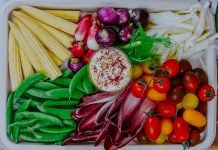
Iodine, the Tiny Superhero
Imagine being a superhero whose power is to help the body make energy and grow properly. That’s exactly what iodine does! It’s a tiny superhero that resides in our food.
However, there’s a catch – our body doesn’t produce iodine naturally, so we need to get it through our diet.
But what happens if iodine-rich foods like fish and milk aren’t part of our menu? This is the case for vegans and vegetarians. Let’s unravel the mystery of iodine in these diets.
Iodine 101: The Role of Iodine
Iodine is a mineral that plays a crucial role in keeping our bodies healthy. It has a major function in the thyroid gland, a small butterfly-shaped gland in the neck that regulates how our body uses energy.
The thyroid gland relies on iodine to perform its job effectively, which is why it’s essential to consume foods that contain iodine.
The Challenge for Vegans and Vegetarians: Iodine Deficiency
Vegans and vegetarians follow diets rich in fruits, vegetables, beans, grains, and nuts.
Vegans exclude all animal products, including milk and eggs, while vegetarians avoid meat but may include dairy products and eggs in their diet.
While these diets offer numerous health benefits and are environmentally friendly, they often lack iodine-rich foods like fish and dairy products.
Scientists to the Rescue! Investigating Iodine Intake
Recognizing the importance of adequate iodine intake, scientists conducted a comprehensive investigation.
They analyzed several studies that focused on the iodine levels in the diets of vegans and vegetarians. These studies were published between October 2020 and December 2022.
The Findings: A Piece of the Puzzle
The scientists examined 11 different studies involving 4,421 adults. Their findings revealed that vegans had the lowest levels of iodine in their bodies.
Insufficient iodine levels can lead to health problems, as specified by the World Health Organization.
Additionally, the studies showed that vegans consumed the least amount of iodine-rich foods. Since our bodies cannot produce iodine, it is essential to obtain it through our diet.
Factors Influencing Iodine Intake
The scientists identified several factors that influenced iodine intake among vegans and vegetarians.
These factors included gender, whether iodine was added to salt (a process called “iodization”), and the overall iodine content in the food supply of a specific country.
The Next Step: Ensuring Adequate Iodine Intake
The key takeaway from this research is that individuals following vegan or vegetarian diets must ensure they are obtaining sufficient iodine.
This is especially important in regions where iodine is not added to salt. This may involve consuming foods fortified with iodine or considering iodine supplements.
Further research is needed to determine the best approach for vegans and vegetarians to meet their iodine requirements.
Conclusion: Empowering Vegans and Vegetarians with Adequate Iodine
With a little planning and awareness, vegans and vegetarians can continue to follow a healthy diet while ensuring sufficient iodine intake.
While iodine may pose challenges in these diets, it is possible to obtain this vital mineral through alternative sources.
Scientists continue to explore the best strategies for meeting iodine requirements in vegan and vegetarian diets.
The study was published in the British Journal of Nutrition, contributing valuable insights to the understanding of iodine intake in vegan and vegetarian diets.
If you care about weight management, please read studies about diets that could boost your gut health and weight loss, and 10 small changes you can make today to prevent weight gain.
For more information about weight loss, please read studies that avocado could help you lose weight and belly fat, and a keto diet for weight loss can cause flu-like symptoms.
Copyright © 2023 Knowridge Science Report. All rights reserved.




